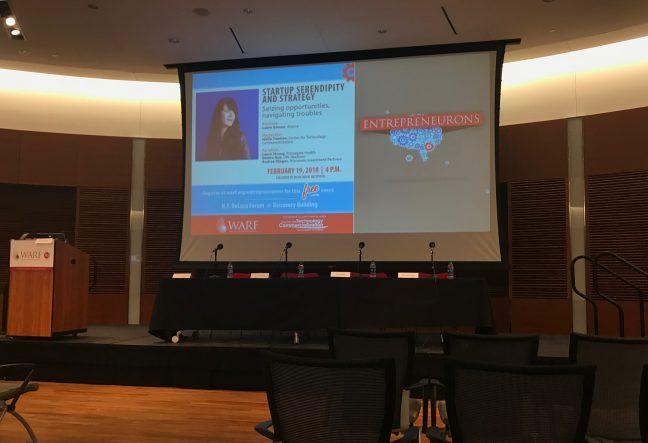A panel of women entrepreneurs met Monday to discuss the opportunities, preparation and logistics needed to create a successful startup.
The panel was the first session of a Wisconsin Alumni Research Foundation lecture series called “Entrepreneurons.”
Laura Gomez, chief executive officer of talent recruitment firm Atipica, was Monday night’s first keynote speaker.
Center for Technology Commercialization representative Idella Yamben, Propagate Health CEO Laura Strong, University of Wisconsin professor of nutritional science Denise Ney and Wisconsin Investment Partners manager Andrea Dlugos joined Gomez as speakers.
Gomez, a Silicon Valley native, said she has been interested in technology since an early age. Interning at Hewlett-Packard before studying at the University of California — Berkeley, Gomez later went to work for Twitter in its early days.
Gomez discussed how Twitter played a major role in the 2011 Arab Spring protests, as users were taking to the platform to warn about natural disasters, inform about government policy and create a mass following and support for uprisings.
“We really thought we were building the future of communication,” Gomez said. “Our optimism did not allow us to see what it would become, how it would affect democracy.”
Gomez went on to explain her current work as the founder and CEO of Atipica, a company that predicts hiring needs for companies based on historical, current company and applicant behavior data. They use this data to guide companies.
Gomez discussed the challenges of getting a company off the ground, especially as a woman in a male-dominated field.
“Only 2 percent of venture capital went to female founders in 2017,” Gomez said. “When we have more female founders, we will then be able to think of wealth of creation, and ecosystems will thrive.”
The need to include more women in technology sparked Project Include, a non-profit community accelerating meaningful and enduring diversity and inclusion in the tech industry.
Gomez was one of eight founding members of the organization.
“We were all just eight women who decided we cared enough about something to do something about it, and we wanted to accelerate inclusion in the tech industry,” Gomez said.
Gomez and the panel described their personal journeys as entrepreneurs, what it means to be one, who can be one and how success and failure are defined.
The conversation was centered on the individual and the panelists shared tips on the ups and downs of being a female entrepreneur.
Ney described herself as a non-traditional entrepreneur but said anyone with an idea can be an entrepreneur. She said her work with the nutritional management of metabolism disorder phenylketonuria made her an entrepreneur.
The panelists agreed that being an entrepreneur can mean many things and all entrepreneurial endeavors start with an idea that has the potential to help people.
“You don’t have to be a scientist, the one with the idea, or the owner of a company,” Dlugos said. “You just have to help make those project what they are. It takes a team, and if the idea is smart enough, people will join you.”
The next Entrepreneuron seminar will feature keynote speaker Gordon Nameni and will take place Wednesday, Feb. 28 at the Wisconsin Institutes for Discovery.


